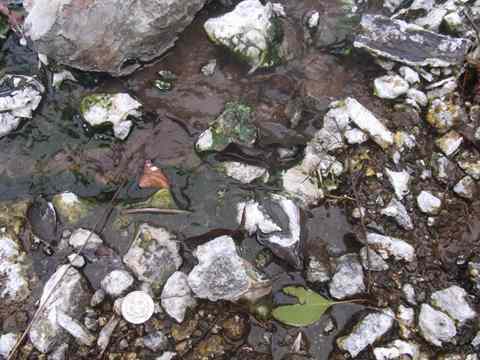Jakotsu River
Sokokura, Hakone city, Ashigara-Shimo county, Kanagawa pref., Japan
Synonym
Sokokura Hot Spring
Occurrence
Siliceous sinter deposited from neutral Na-chloride hot spring water formed by the volcanic activity of the younger central cone of Hakone Volcano. The hot spring is a member of the Jakotsu Hot Springs, and flows from the Late Pleistocene (50 ka) Kamiyama debris flow deposit formed at the early stage of the younger central cone formation process of Hakone Volcano. The origin of the Kamiyama debris flow deposit is Mount Kamiyama, the younger central cone of Hakone Volcano. The Kamiyama debris flow deposit is composed of eruption products of the younger central cone, and unconformably overlies the middle Miocene (13 Ma) Yugashima Group and the Early Pliocene (4 Ma) Hayakawa tuff breccia. Ages of sedimentary rocks were determined by microfossils.

Siliceous sinter from neutral Na-Chloride hot spring water. The white crusts on pebbles in the flow of hot spring water are siliceous sinter. Dissolved Si in the hot spring water deposits as temperature of hot spring water is lowered as it flows on the surface. Siliceous sinter is also developed on the leaves, and forming leaf mold, a type of fossil. The rounded pebbles in the hot spring flow are pebbles of the Kamiyama debris flow deposit.
Reported Minerals
- Siliceous sinter
History
- 1590: Hideyoshi Toyotomi used this spring for consolation of soldiers before attacking Hojyo at the Odawara castle.
- since 1600's: The hot springs have been used for Onsen therapy.
Localities
- Jakotsu River (Siliceous sinter)
- Atami Hot Spring (Siliceous sinter)
Related Occurrences
- Travertine (Calcareous sinter)
- Siliceous sinter
- Sulphur sinter
- Bog iron
- Vitriolic sinter
- Wad
- Stalactite
- Tufa (Calcareous sinter)